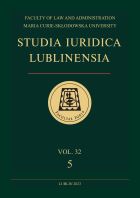Change of Parties in the New Hungarian Civil Code from a Comparative Perspective
Change of Parties in the New Hungarian Civil Code from a Comparative Perspective
Author(s): Péter GárdosSubject(s): Civil Law, Comparative Law
Published by: Wydawnictwo Naukowe Uniwersytetu Marii Curie-Sklodowskiej
Keywords: codification; change of parties; non-assignment clause; transfer of receivables; debtor; assignor; comparative law;
Summary/Abstract: The Hungarian Civil Code introduced changes regarding the change of parties. The paper argues that comparative law helped the Hungarian legislator to introduce new rules that address relevant market needs. The author shows how the clarification of the system of the transfer of receivables opened up new opportunities for the parties and how the treatment of non-assignment clauses changed in light of legislative changes in several European countries. It is argued that the new Hungarian Civil Code found the right balance between the interests of the debtor and the assignor. The second part of the article explains that the New Civil Code introduced a significant change through the rule on free transferability of rights. The third part presents how the New Civil Code introduced rules on the transfer of contracts, following the solutions of several European countries and international unification instruments, and explains the challenges posed by these rules.codification; change of parties; non-assignment clause; transfer of receivables; debtor; assignor; comparative law
Journal: Studia Iuridica Lublinensia
- Issue Year: 32/2023
- Issue No: 5
- Page Range: 117-142
- Page Count: 26
- Language: English

